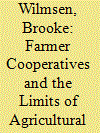|
|
|
Sort Order |
|
|
|
Items / Page
|
|
|
|
|
|
|
| Srl | Item |
| 1 |
ID:
147604


|
|
|
|
|
| Summary/Abstract |
At the Third Plenary of the 18th Chinese Communist Party Central Committee, the Party announced a number of rural reforms. Commentators were quick to pronounce a win for farmers’ land rights. However, the broader commitment of the Chinese Communist Party (CCP) to deepening economic liberalization raises the question: can these reforms protect farmers’ rights in the event of land acquisition? The author draws on fieldwork, recent interviews and China’s documented history of land acquisition practice to identify four risks posed by these reforms: undervaluation, elite capture, exploitation and the expansion of the urban underclass. The article concludes that China’s steadfast resolve to expand capitalism in rural China is undermining its attempts to secure rural property rights.
|
|
|
|
|
|
|
|
|
|
|
|
|
|
|
|
| 2 |
ID:
190380


|
|
|
|
|
| Summary/Abstract |
There has been remarkable growth in the number of cooperatives in China in the past decade. This article asks: what role are cooperatives playing in driving China’s ambitious agricultural reforms? The scholarly literature describes farmer cooperatives as either an important entity for progressing China’s rural modernization agenda, a vehicle of exploitation and dispossession of smallholder farmers, or evidence of broader commitment to grassroots solidarity. Despite the rapid expansion of farmer cooperatives, the role that they play in the livelihoods of smallholder farmers in places where agriculture remains central and out-migration is low is poorly understood. To explore this, in 2019 we conducted a survey of 266 households in the mountains of Hubei Province. To illuminate the politics and dynamics on the ground, we followed up by conducting in-depth interviews with agribusinesses, cooperatives, households, and local government officials. Our findings suggest that although cooperatives are attempting to engage with smallholders, they are neither integrating nor exploiting them. While seemingly innocuous to the livelihoods of smallholder farmers, these entities serve a mostly political function, and it is in these dynamics that we observe the limits of agricultural reform. Where smallholder production is lucrative, land is valuable, and out-migration is minimal, local government appears to be “performing” reform, without forcing it on smallholders and thereby harming the local economy or risking social unrest.
|
|
|
|
|
|
|
|
|
|
|
|
|
|
|
|
| 3 |
ID:
168444


|
|
|
|
|
| Summary/Abstract |
Planned resettlement is being widely considered as a response to the impacts of climate change. As many millions of people are expected to be displaced in the coming decades, scholars and policymakers are searching for precedence to inform their research and planning, particularly from experiences of Development‐Induced Displacement and Resettlement (DIDR). Nowhere in the world is DIDR and other closely related forms of planned resettlement more prevalent than in China: an estimated 78 million people have been displaced by development projects over the last six decades. While planned resettlement has consistently been shown to cause impoverishment, the Chinese state views it as the answer to a multitude of social ills including poverty, environmental damage, low levels of domestic consumption, and most recently, climate change, providing impetus to the normalisation of resettlement as adaptation. This paper examines the prospects for just outcomes in resettlement projects by examining distributive justice at multiple scales in existing resettlement practice in China. It finds that due to the interplay between resettlement and questions of procedural justice, prospects for just outcomes are quite limited, and that in order to achieve fair adaptation, alternatives to planned resettlement should be emphasised.
|
|
|
|
|
|
|
|
|
|
|
|
|
|
|
|
| 4 |
ID:
106541


|
|
|
|
|
| Publication |
2011.
|
| Summary/Abstract |
The construction of large dams continues apace in many developing countries. This is no more evident than in China, where half of the world's large dams are now located. A decade ago the World Commission on Dams released its review of large dams around the world. The report provided a framework for the decision-making of governments, donors, policymakers, planners, and dam builders across seven strategic priorities: to gain acceptance; assess options; address existing dams; sustain rivers and livelihoods; recognize entitlements and secure benefits; ensure compliance; and share rivers across boundaries. Using the strategic priorities as a frame for analysis, this article reviews the progress made by the Chinese government over the last 10 years with respect to addressing the human casualties of large dam construction. It identifies specific frailties and strengths in Chinese policy and practice. It suggests that a stakeholder satisfaction model that places the affected population at the centre of the accountability structure would ensure that those who are tasked with the administration of resettlement policies are answerable to the affected people. In this way, resettlement from large dams can become truly people-centred.
|
|
|
|
|
|
|
|
|
|
|
|
|
|
|
|
|
|
|
|
|